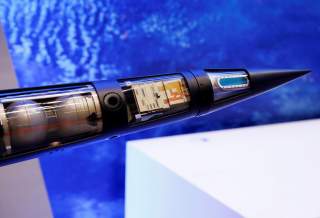Why South Korea Needs THAAD
North Korea makes this missile defense system a must have.
The United States’ top military official in South Korea is expressing his confidence in Lockheed Martin’s Terminal High Altitude Area Defense missile defense system.
Washington has deployed the THAAD to the Korean peninsula to deter North Korea, which has stepped up testing of its ballistic missiles. The THAAD is designed as a theatre missile defense system but has a limited capability to defeat even intercontinental ballistic missile in the terminal phase of flight.
“This most recent interception of a Medium Range Ballistic Missile, like the previous one against an Intermediate Range Ballistic Missile, adds to the confidence I have in the THAAD system deployed to Seongju to defeat the North Korean threats against the Republic of Korea,” Gen. Vincent K. Brooks, Commander for United Nations Command, Combined Forces Command and U.S. Forces Korea, said in a statement.
“After this recent interception, especially given that this is the 15th or 16th successful live interception by THAAD, I do not know why anyone would doubt that it is capable of doing what we intended for it to do by deploying it here to Korea -- that is, defeat incoming north Korean ballistic missiles threatening the Republic.”
While the United States has discussed military options to counter Pyongyang’s nuclear and ballistic missile programs, realistically the only option is to harden South Korean and Japanese defenses.
“I do not believe there are direct military actions that could dissuade or prevent the regime from pursuing ballistic missiles and nuclear weapons without risking a response that could devastate Seoul,” Mark Gunzinger, a former Air Force B-52 bomber pilot and current senior fellow at the Center for Strategic and Budgetary Assessments told The National Interest.
The best and most realistic option is to build up allied air defenses in the region.
“Building up the capacity of air and missile defenses in Japan and the ROK would certainly help ‘harden’ our allies against the growing threat of DPRK strikes,” Gunzinger said.
“Significant additional long-range sensors and batteries for missile defense in South Korea and Japan could also increase pressure on China to take more concrete actions against its proxy troublemaker... I think this option is worth consideration.”
Indeed, despite the earlier U.S. insistence that it will not tolerate a nuclear-armed North Korea that also possesses ICBMs, Washington seems to be backing off seeking a regime change in Pyongyang.
“We do not seek regime change. We do not seek an accelerated reunification of the peninsula. We do not seek an excuse to send our military north of the 38th parallel," Secretary of State Rex Tillerson told reporters during a briefing on August 1.
"We are not your enemy, we are not your threat, but you are presenting an unacceptable threat to us and we have to respond."
Nonetheless, it is very unlikely that North Korea will accept any security guarantees from the United States in exchange for giving up its weapons—not after Washington overthrew the Libyan government in 2011. Essentially, North Korea has made the simple realist calculus that a weapon that might deter the United States and preserve the regime trumps any economic or diplomatic benefit—such as a security guarantee.
“Libya’s nuclear dismantlement much touted by the U.S. in the past turned out to be a mode of aggression whereby the latter coaxed the former with such sweet words as ‘guarantee of security’ and ‘improvement of relations’ to disarm and then swallowed it up by force,” the North Korean Foreign Ministry stated at the time—denouncing negotiations as a prelude to disarm the regime prior to an invasion.
Dave Majumdar is the defense editor for The National Interest. You can follow him on Twitter: @Davemajumdar.
Image: Reuters.

